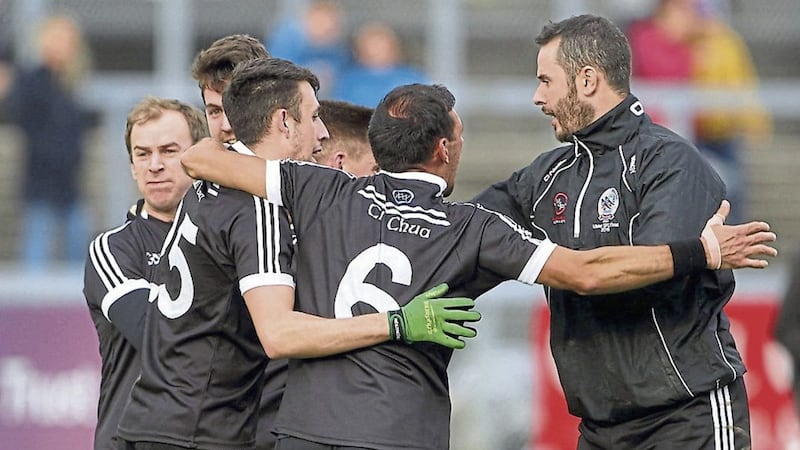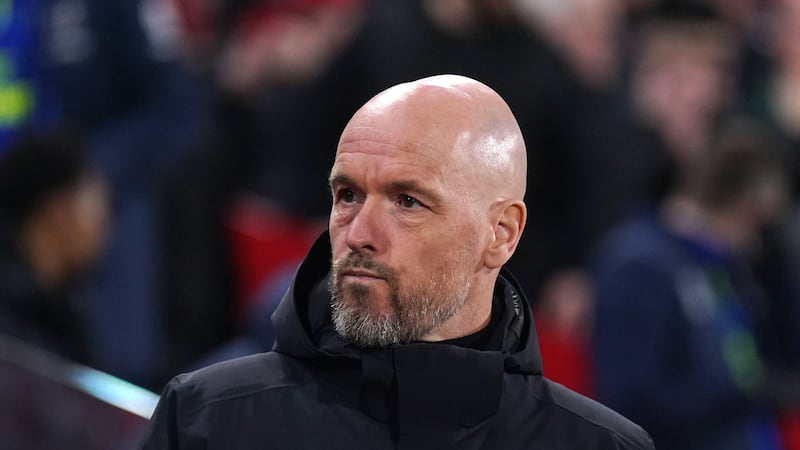I WAS driving through Kilcoo towards the latter end of last week and the one thing that dominates the tiny hamlet is the GAA club’s artistic work.
For anyone who hasn’t travelled through the road from Hilltown to Castlewellan, Kilcoo lies between both villages and, if you are not careful, you could blink and almost miss it.
There is the chapel then the smallest of convenience stores (which hasn’t changed in my lifetime) and then a big whitewashed wall as you are leaving, something which always catches your eye.
I remember when we used to travel to Castlewellan and Newcastle to train with Down, the whitewashed wall in Kilcoo would have left passers-by and inhabitants with food for thought.
The rather unmistakable messages were clearly choreographed, not the graffiti you would see in a tunnel or a side street.
But that was then. The Good Friday Agreement was still in its infancy and progress was slow politically.
Whether it was ironic or not, peacetime and progress coincided with a new beginning for Kilcoo who were becoming a force as a team and a force to be reckoned with outside of Down.
Now that same hamlet and whitewashed wall carries the letters ‘UTM’ – ‘Up The Magpies’ – something which you will hear chanted at their championship matches, due to their black and white club colours.
From the outside looking in, Kilcoo follow a similar path to that of Crossmaglen, albeit eras apart and in a very different atmosphere.
Crossmaglen had the imposing army barracks decorated with paint, bullet holes and anything that would stick.
Crossmaglen was the front line of the troubles and part of that historical team’s legacy was their unbreakable spirit as a football team.
This innate toughness was a characteristic of the community itself and the efforts of the GAA club over the years saved many lives, especially in chanelling the young people’s energy in the right direction.
I doubt I will ever see a team of their like again in my lifetime.
It seems, though, that Slaughtneil have become their very own republic in Derry.
They have now become the standard-bearers in Ulster club football, camogie and hurling, having taken this mantle more recently from the great Crossmaglen Rangers.
What makes it more astonishing is that Slaughtneil are fighting a battle on three fronts – across three codes.
Although camogie doesn’t have a direct bearing on the men’s football and hurling, financing of it does and it takes an unbreakable community spirit to achieve such feats.
However, we have to remember that Slaughtneil have yet to win an All-Ireland title and they will be keen to add All-Ireland club success this year to the list of achievements.
Winning Ulster titles is one thing. However, the history-makers like Crossmaglen follow these up with All-Ireland titles.
St Vincent’s fell to a shock defeat by Rathnew of Wicklow last weekend. Slaughtneil will be buoyed by this result and may finally be able to land that coveted All-Ireland crown they cherish. It would be a truly historic achievement for the club.
The similarities between the aforementioned clubs perhaps indicate one fact – no love is lost for them outside their own communities.
Each player representing them will put the club first and the county second.
It was the depiction on a mural when I was driving through Kilcoo that confirmed this.
There was a painted image of four individuals, three wearing Kilcoo club jerseys and a fourth wearing a Down jersey with number 16 on it. For me it was symbolic. Kilcoo first, Down second.
From a county perspective, any representatives who played with Down always played their club games even when they were told that this wouldn’t be tolerated.
Deduction of league points and other such penalties were threatened and, in the ensuing stand-offs, it was usually the county board who blinked first.
It is hard to believe with such utter domination of club football via Crossmaglen over the years that Armagh have only one All-Ireland in 2002 to show for their efforts.
Yes, they may have dominated the Ulster Championship in part alongside Tyrone. However, even some of the Armagh players themselves feel they under-achieved at county level.
Crossmaglen players who represented both club and county at the time can feel less disappointed in part because, like Kilcoo, it still felt like a ‘Cross first, Armagh second’ mentality.
I think Joe Kernan’s best years were when he channelled that Crossmaglen winning mentality and incorporated it into the county side. The key here was a Crossmaglen man as the county manager.
Like most insular clubs, outsiders are not taken to well. If the new Derry management was able to incorporate and foster a similar spirit, there is no reason why Derry’s fortunes couldn’t be transformed.
Down have a similar job to do and a number of the individual Kilcoo players are now beginning to make their mark at county level.
However, it is their defining spirit which should be mined and that will take more than just a few players.
While Kilcoo have outside managers who come and go, the one constant is the fact that the spirit in which they play never changes.
Successful teams carry the same characteristics. The All-Blacks, the Ireland rugby team and Dublin have all a core set of principles. Honour, humility and pride.
The personnel may change, but the spirit with which they play does not. There is an identity to their team.
It was while I drove back from my initial journey through Kilcoo that a mentality sprung to mind that could easily be adopted for some of the most successful teams in the world.
‘From Down but, by the grace of God, born in Kilcoo’.






